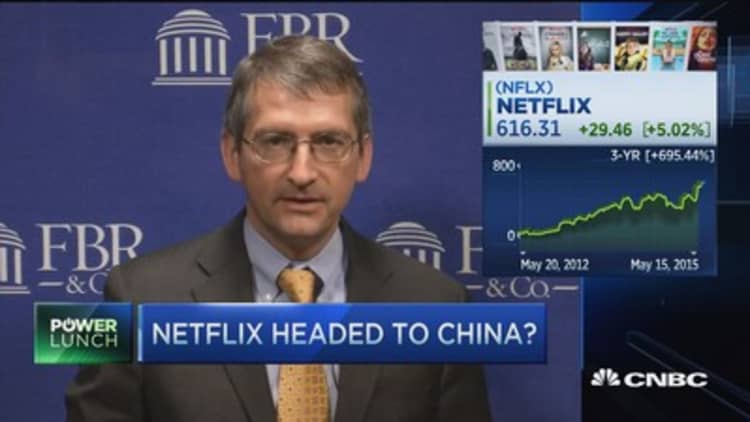


Netflix stock shot above $600 last week on reports that the company was in talks to enter China, but the company will likely not find an easy road in Asia's largest economy.
The streaming service—whose shares were changing hands at $618 Wednesday—spoke with several Chinese companies about potentially partnering in China, according to reports from Bloomberg and Dow Jones. But it's still unclear whether those discussions could materialize into any significant upside for the company.
"I think this is five years away from happening—not one," Wedbush Securities analyst Michael Pachter said of Netflix's chances for developing a business in China. "The market reaction to this is premature at best, and ridiculous at worst."
Netflix declined to comment on the reports that it held talks with the likes of Jack Ma-backed Wasu Media. Instead, a spokeswoman for the company directed CNBC to a statement in Netflix's January investor letter that described exploring "modest" options in China.
Several major headwinds face Netflix in China, and they derive from both a challenging regulatory environment and consumer preferences that differ from those in the United States.
On the regulatory side, Chinese laws require a Beijing-granted license that allows a company to operate any form of Internet-TV. There are reportedly only seven firms allowed to act as providers. That likely means that Netflix would have to team up with a Chinese company in order to operate.
Read More Cramer: About time Netflix made it to China
Any such partnership would severely cut into Netflix's potential revenue from its Chinese business, Pachter said.
Additionally, China's State Administration of Press, Publication, Radio, Film and Television requires all foreign shows and movies to be registered and vetted before they can be shown online, according to multiple reports. Much of Netflix's original content features sex or violence—both discouraged by Beijing's censors—so it's unclear how much of it would be cleared for Chinese consumers.
"The value Netflix adds to the Chinese audience is giving them access to content they can actually see," Pachter said, explaining that the streaming service will have trouble selling itself to a new audience in the absence of a well-known brand and unique content.
As for the company's content, Pachter said that a deal with Disney could potentially allow for global exclusivity on certain titles, but that most titles could also be offered by Chinese competitors.

And that would-be competition is well-developed. Sites like Youku Tudou already boast strong numbers in the marketplace, meaning that Netflix couldn't easily muscle its way into homes.
But even if Netflix could exclusively offer content that Chinese consumers wanted, and also found a way to legally offer it, rampant piracy would likely still present a problem.
A domestic partner could help cut down on piracy by getting the government involved, Pachter said. But between illegal reproductions and the proliferation of ad-supported streaming services, Chinese consumers are simply not accustomed to paying for media content.
Ad-supported platforms, however, are seeing huge growth in China: Revenue for the online video market reached 6.81 billion yuan (about $1.10 billion) in the first quarter of 2015—a 74.7 percent year-over-year increase, according to consulting firm iResearch.
Still, some analysts see a future for Netflix in China. A Tuesday note from Pivotal Research Group's Jeffrey Wlodarczak forecast that the company would achieve 5 percent market penetration for China's broadband households by 2021.
Read MoreSuper-bullish Netflix call draws analyst's ridicule
That research indicated Netflix could see 13.5 million Chinese subscribers by 2021, but Beijing's "Broadband China" initiative set a goal of 400 million broadband households by 2020—implying more than 20 million for Netflix at 5 percent penetration the following year.
Either way, Wlodarczak raised his price target from $650 per share to $850 on signs of a faster-than-anticipated rollout in China and South Korea.
That target isn't even Wall Street's largest, with one calling for a $900 stock price. Pachter, meanwhile, maintains a "sell" rating on the stock with a 12-month target of $270, according to FactSet.
But even Pachter admits that China may hold some kind of promise for the company. "Netflix would be foolish not to explore the Chinese market," he said.


